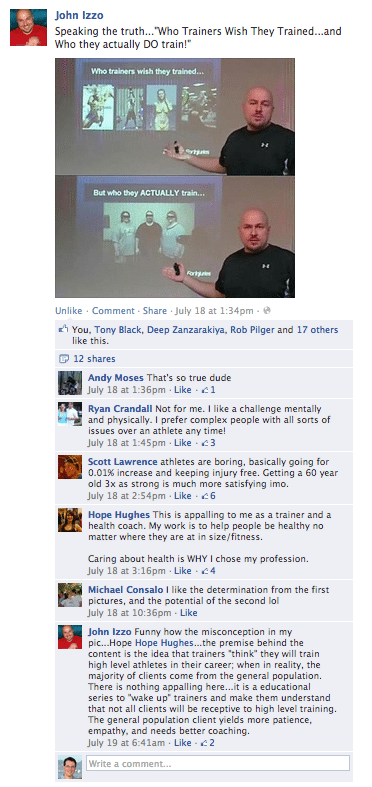
Tough question for personal trainers:
What do you think of the question, who do trainers train? Is he right? Is he wrong? What percentage of your clients are general population clients?
John first posted the question on his Facebook page. It got a great discussion going:
John typically makes mistakes when it comes to assessments. One most extensive error is that trainers tend to look at the body in two dimensions. We all know that we’re two-dimensional figures. Trainers tend to apply textbook anatomy instead of functional anatomy, which is a big mistake.
We also tend to look for absolute outcomes rather than the process. It means when we see a picture of a client through an overhead squat profile or a single squat, single leg joint, or a single leg squat assessment for assessment.
We always try to get them in the position that we see in the picture from the course of the textbook of what we learned. As a trainer, we must remember that we’re taking them through a process, and not everything will get corrected. It cannot be done In one session, the second session, or the third session; they need time to process.
Another big mistake that many trainers tend to make is they don’t consider fatigue. And that’s a significant underrated factor when we are training our clients or performing assessments, you get as someone who’s overweight, and you’re using an overhead squat. You have them doing several squats, and they get quickly tired.
Here is a clip from John Izzo’s presentation on Assessment & Exercise for Personal Training:
Who Do Trainers Wish to Train?
There are three categories for personal training clients. Which one do you prefer to train? This is how you can choose the path that suits your needs.
Personal training clients can be classified into one of these three categories:
- Performance clients are (athletes). These clients train to compete at a higher level in a sport or profession.
- Physique clients. These clients desire to look beautiful naked. They want to look great naked.
- Fitness clients. These clients work out for various reasons: stress relief, weight loss, health improvement/maintenance, muscle or toning, increased productivity, and enjoyment.
Are you Interested in Training Athletes?
It is not easy to become a professional athlete trainer. Becoming a professional strength and conditioning coach can take two main paths.
- Internship with a facility known for its client training.
- You can do a great deal for a small college or minor league team.
Do You Want to Train Physique Clients?
Few facilities or trainers can consistently make remarkable physique changes, just like in high-performance athletics. You should learn from those who have achieved remarkable physique transformations in their clients if you are looking to train bodybuilders or models for fitness shoots.
Clients of Physique are not just those who want to look suitable for photos. In reality, many clients don’t have the time or desire to go through the hard work required to achieve the transformations we see in magazines.
Are you Interested in Training Clients in Fitness?
Taking on clients interested in fitness is challenging because you will meet various people. You are responsible for your client’s entire well-being, not just their physique or high-performance clients.
Last year, ordinary people contributed to the fitness industry’s $17 billion value. High-performance athletes and clients who have undergone physique or transformation make up the rest of the pie.
You must be an excellent personal trainer if you want to make a career out of it, and this requires two things:
- Learn the soft side of training. Recognizing consistency and adherence are more critical than advanced physiological knowledge when helping clients achieve long-term results is essential.
- Relationships matter. Fitness clients don’t buy training but trainers. Be a good sport, share your knowledge, and you will be the most liked person at your gym.
This is a gratifying job, but it takes practice. Personal training is a lucrative career. I recommend finding a great facility or manager to work for.
Some kind words about Muscle Imbalances Revealed:
Watch for John’s presentation; it will be coming out next week as part of the Muscle Imbalances Revealed – Assessment & Exercise edition
Rick Kaselj, MS



